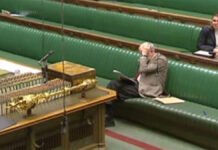The EU’s nightmare: The domino effect, Both Norway’s Socialist Left Party and Centre Party want a better deal.
Both Socialist Left Party (SV) and Centre Party (Sp) believe the British Brexit agreement is better than Norway’s EEA agreement.
The Socialist Left Party of Heming Olaussen believes the agreement “in the long run can turn the Norwegian EEA debate” in favour of those who want a renegotiation of the agreement.
– The Brexit agreement shows that there are obviously better alternatives to the EEA. Brexit refutes the thesis that we must have the EEA to trade with the EU, he says.
Leader of No to the EU Roy Pedersen believes that the agreement is “very interesting” for the Norwegian EEA debate.
– It shows that other agreements with the EU are possible. A demand from the Norwegian trade union movement has been that we get a public report on a free trade agreement as an alternative to the EEA. With the British Brexit agreement, this demand has moved closer.
Norway’s Centre Party Arnstad believes that the agreement also proves that it is possible for a country to have a free trade agreement and at the same time participate in a number of EU programs.

Norway’s Centre Party has called the UK’s trade deal with the European Union “a better agreement” than the one Norway has as a member of the European Economic Area.
Marit Arnstad, parliamentary leader of the Centre Party, said in an interview with the Klassekampen newspaper on Tuesday that the UK had shown Norway could get a better deal than what it currently has as a member of the European Economic Area (EEA).
“The UK has got a deal with gives them more freedom and more independence,” she said.
“From my point of view, the British have a better agreement than the EEA. They gain access to the internal market and common trade, which is desirable, but they do not have to be part of the dynamic regulatory development that places strong limits on individual countries’ national policies.”
The former agrarian party last month overtook the Norwegian Labour and Conservative parties, the traditional leading parties of left and right, in polling ahead of next September’s general election, sending a political shockwave through the country.
Norway’s Centre Party joined the red–green coalition government led by the Labour Party in 2005. The red–green coalition was a centre-left coalition of parties in Norway, constituting the Labour Party (Ap), the Socialist Left Party (SV), and the Centre Party (Sp). Unlike many other Red-Green coalitions, the “green” here was the colour of a centrist eurosceptic Nordic agrarian party rather than an actual green political movement. It governed from 2005 until Labour Party leader Jens Stoltenberg resigned his cabinet on 16 October 2013 following the coalition’s defeat in the 2013 elections.
The Centre Party has maintained a hardline stance against Norwegian membership in the European Union, successfully campaigning against Norwegian membership in both the 1972 and 1994 referendums, during which time the party saw record-high election results. Subsequently, the party advocated Norway’s withdrawal from the European Economic Area and the Schengen Agreement.
In her interview with the Klassekampen newspaper, Arnstad emphasizes that she has not read the entire text. But based on those she has read, she believes the agreement both safeguards trade and increases national sovereignty.
- Is the British agreement with the EU better than the EEA agreement?
- Yes, from my point of view, the British have a better agreement than the EEA. They get access to the internal market and the common trade that is desirable, but they do not have to be part of a dynamic regulatory development that places strong ties on the individual countries’ national policies, she says.
Will re-evaluate EEA
Sp and SV have previously advocated a public study on an alternative to the EEA agreement, which regulates Norway’s relations with the EU.
The leader of SV’s EEA committee, Heming Olaussen, also believes that the British agreement with the EU is better than the EEA.
- Yes, because the British release the European Court of Justice. Then they are no longer subject to EU supremacy and must not accept any EU legislation in the future as we must. This agreement is qualitatively different and safeguards national sovereignty in a better way than the EEA does for us, says Olaussen.
Arnstad cites the EU’s financial supervision and the energy agency Acer as two current examples of what the British are now releasing.
- The most difficult thing for Norway is that we are bound in areas that are national policy, and that it happens in more and more areas. The British have now taken back this authority, and it is extremely interesting.
Ms Arnstad said that after seeing the UK’s success, her party would renew its calls for a public inquiry into possible changes to EEA membership.
“I think it highlights the need to study alternatives to the EEA,” she said. “The most difficult thing for Norway is that we are constrained in areas of national politics, and that is happening in more and more areas. The British have now taken back these powers, and that is extremely interesting.”
The Centre Party’s call for an inquiry is backed by the Socialist Left Party, with Heming Olaussen, head of the party’s EEA committee, telling Klassekampen that the UK’s deal was superior.
“The British have been released from the European Court of Justice. They are no longer subject to EU supremacy and must not accept any EU legislation in the future as we have to,” he said.
“This agreement… safeguards national sovereignty in a better way than the EEA does for us.”
Even after the Centre Party’s recent surge in the polls, however, eurosceptic parties in Norway still lack a parliamentary majority.
Both Labour and the Conservatives are historically pro-EU, and Norway’s Prime Minister Erna Solberg argued earlier this month that the UK’s Brexit struggles should serve as a warning to Norwegian eurosceptics.
“Political parties in Norway that think it is a good idea to leave the EEA because we can negotiate new, better agreements should look more closely across the North Sea,” she said.
Frames yes-scares
Red leader Bjørnar Moxnes writes in an e-mail to Klassekampen that the Brexit agreement “gives a boost to the Norwegian yes-side’s intimidation propaganda that we lose access to the European market if we do not submit to any dictation from Brussels through the EEA agreement “.
Moxnes believes it is too early to draw conclusions about how the agreement will turn out.
“But it shows at least that it is possible to negotiate agreements with the EU that better safeguard democracy and national sovereignty than the EEA agreement,” he writes.
Support Independent Journalism Today
Our unwavering dedication is to provide you with unbiased news, diverse perspectives, and insightful opinions. We're on a mission to ensure that those in positions of power are held accountable for their actions, but we can't do it alone. Labour Heartlands is primarily funded by me, Paul Knaggs, and by the generous contributions of readers like you. Your donations keep us going and help us uphold the principles of independent journalism. Join us in our quest for truth, transparency, and accountability – donate today and be a part of our mission!
Like everyone else, we're facing challenges, and we need your help to stay online and continue providing crucial journalism. Every contribution, no matter how small, goes a long way in helping us thrive. By becoming one of our donors, you become a vital part of our mission to uncover the truth and uphold the values of democracy.
While we maintain our independence from political affiliations, we stand united against corruption, injustice, and the erosion of free speech, truth, and democracy. We believe in the power of accurate information in a democracy, and we consider facts non-negotiable.
Your support, no matter the amount, can make a significant impact. Together, we can make a difference and continue our journey toward a more informed and just society.
Thank you for supporting Labour Heartlands












